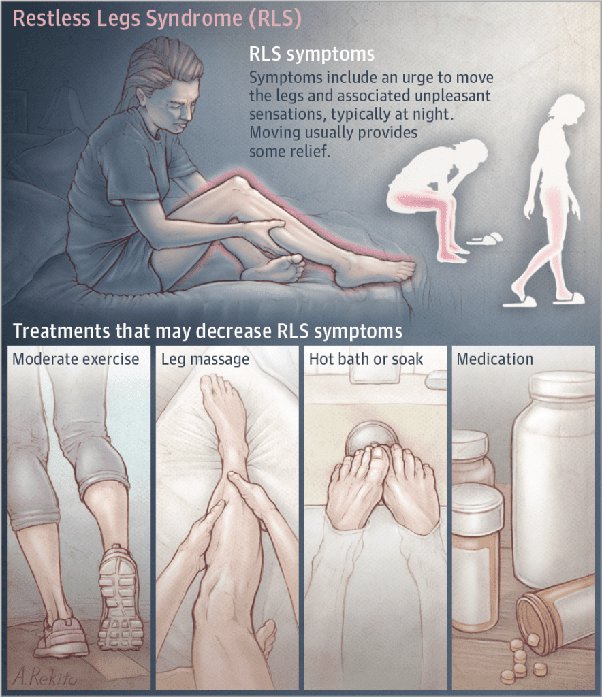Restless Legs Syndrome (RLS)

Restless Legs Syndrome (RLS), also known as Willis-Ekbom disease, is a neurological movement disorder characterized by an uncontrollable urge to move the legs, usually accompanied by uncomfortable sensations such as creeping, crawling, tingling, or pulling. These symptoms typically worsen during periods of rest or inactivity, especially in the evening or at night, and can significantly disrupt sleep and quality of life.
Causes
- Primary (Idiopathic) RLS: Often hereditary, with genetic factors playing a role.
- Secondary RLS: Associated with underlying conditions such as:
- Iron deficiency anemia
- Chronic kidney disease
- Diabetes and peripheral neuropathy
- Parkinson’s disease
- Pregnancy (usually resolves within weeks after birth)
- Certain medications (antipsychotics, antidepressants, antihistamines)
- Brain iron deficiency, even when systemic iron levels are normal, may contribute to symptoms.
Symptoms
- Urge to move the legs, often accompanied by unpleasant sensations in the calves, thighs, or feet.
- Symptoms worsen at rest and improve with movement.
- Symptoms are typically more severe in the evening or night, leading to difficulty falling or staying asleep.
- May involve periodic limb movements during sleep (PLMS), causing further sleep disruption.
- Can cause daytime fatigue, mood changes, difficulty concentrating, and impaired quality of life.
Diagnosis
- Based on clinical history and symptom description.
- No specific test; diagnosis involves ruling out other causes.
- Blood tests to check iron levels and other conditions.
- Sleep studies may be used to assess associated sleep disorders.
Treatment
Lifestyle and Home Remedies
- Regular moderate exercise
- Maintaining a consistent sleep schedule
- Avoiding caffeine, alcohol, and tobacco, especially in the evening
- Leg massages, warm baths, heating pads, or cold packs to relieve symptoms
Medical Treatments
- Iron supplementation: If iron deficiency is present or suspected.
- Dopaminergic agents: Pramipexole, ropinirole, and rotigotine are FDA-approved for moderate to severe RLS.
- Anticonvulsants: Gabapentin, pregabalin, and carbamazepine can help reduce symptoms.
- Benzodiazepines: May improve sleep but can cause daytime drowsiness.
- Opioids: Reserved for severe, refractory cases.
- New therapies: Devices like tonic motor activation (TOMAC) stimulate leg muscles to reduce symptoms.
Summary Table
| Aspect | Details |
|---|---|
| Definition | Neurological disorder causing urge to move legs with uncomfortable sensations at rest |
| Causes | Primary (genetic) or secondary to iron deficiency, kidney disease, diabetes, pregnancy, meds |
| Symptoms | Urge to move legs, unpleasant sensations, worse at rest/night, sleep disruption, daytime fatigue |
| Diagnosis | Clinical evaluation, blood tests, sleep studies |
| Treatment | Lifestyle changes, iron supplements, dopaminergic drugs, anticonvulsants, benzodiazepines, opioids, physical therapies |
| Prognosis | Chronic condition; symptoms can be managed but not cured |
Consult with Our Team of Experts Now!
At DrStemCellsThailand (DRSCT)‘s Anti-Aging and Regenerative Medicine Center of Thailand, we emphasize comprehensive evaluations and personalized treatment plans of Cellular Therapy and Stem Cells for managing various health conditions. If you have questions about Restless Legs Syndrome (RLS) or would like more information on our services, consult with our experts today!
Consult with Our Team of Experts Now!
References
- NHS. Restless legs syndrome – Treatment.
https://www.nhs.uk/conditions/restless-legs-syndrome/treatment/ - Cleveland Clinic. Restless Legs Syndrome (RLS): Causes, Symptoms & Treatment.
https://my.clevelandclinic.org/health/diseases/9497-restless-legs-syndrome - Mayo Clinic. Restless legs syndrome – Symptoms and causes.
https://www.mayoclinic.org/diseases-conditions/restless-legs-syndrome/symptoms-causes/syc-20377168 - Mayo Clinic. Restless legs syndrome – Diagnosis and treatment.
https://www.mayoclinic.org/diseases-conditions/restless-legs-syndrome/diagnosis-treatment/drc-20377174 - WebMD. Restless Legs Syndrome (RLS): Symptoms and Treatment.
https://www.webmd.com/brain/restless-legs-syndrome/restless-legs-syndrome-rls - National Institute of Neurological Disorders and Stroke (NINDS). Restless Legs Syndrome Fact Sheet.
https://www.ninds.nih.gov/health-information/disorders/restless-legs-syndrome - Johns Hopkins Medicine. Restless Legs Syndrome (RLS).
https://www.hopkinsmedicine.org/health/conditions-and-diseases/restless-legs-syndrome-rls
Restless Legs Syndrome is a common, often chronic disorder that can profoundly affect sleep and daily life. While there is no cure, a combination of lifestyle changes, addressing underlying causes, and medications can effectively manage symptoms.















